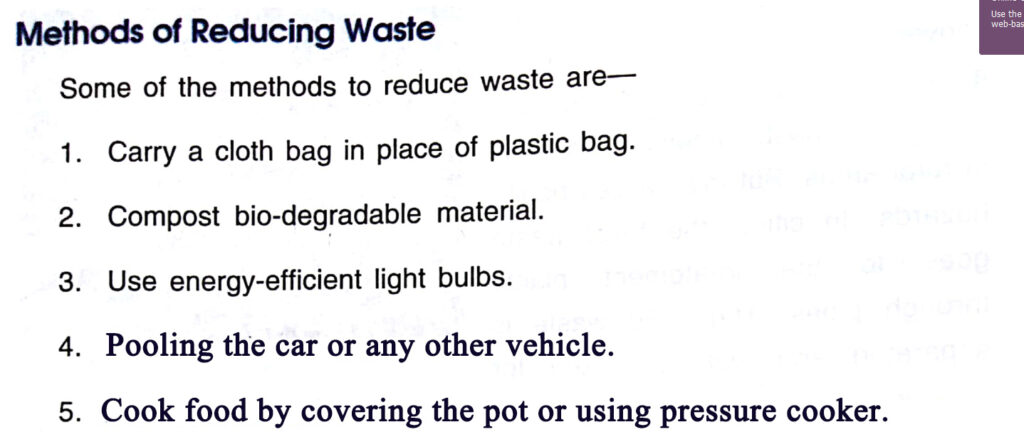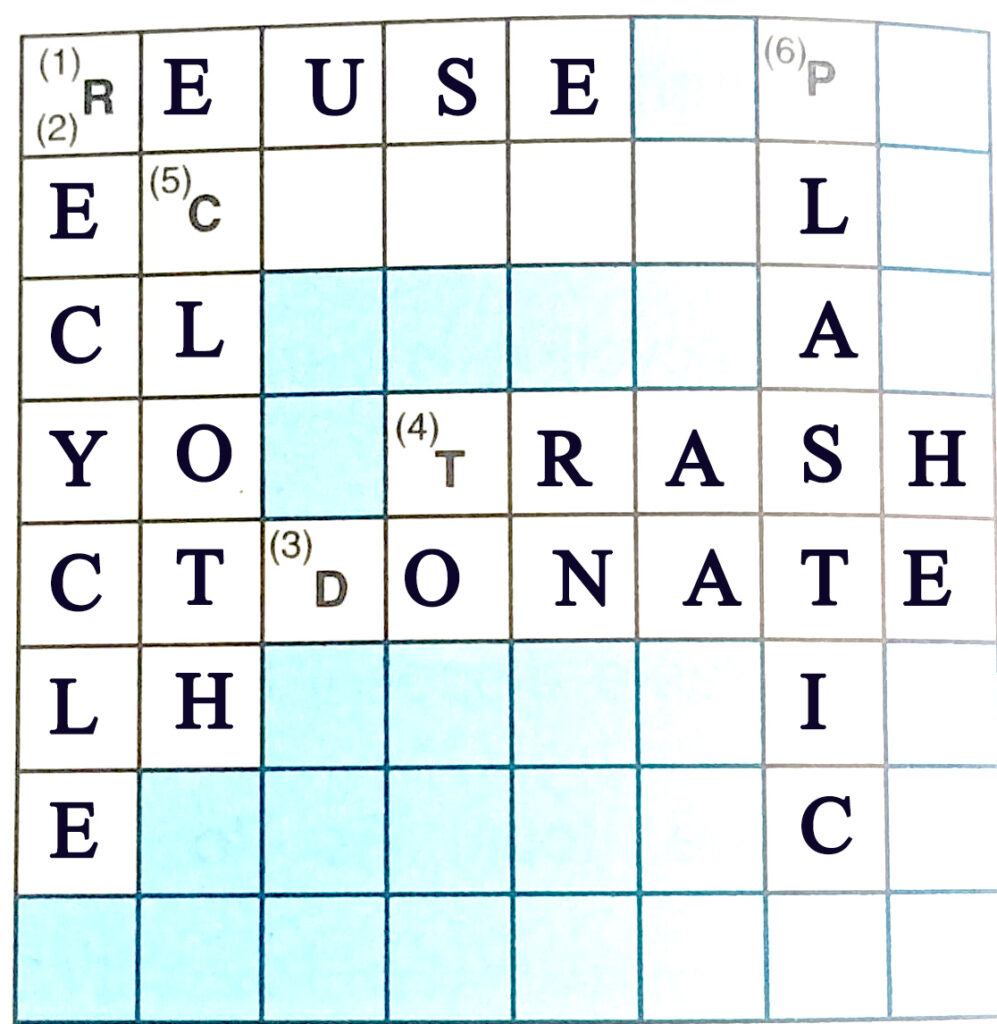
Page – No. 46
SOMETHING TO KNOW
A. Tick (✔) the correct option:
1. Animal and plant waste can be converted into-
(a) Biogas (✔)
(b) LPG
(c) Natural gas
Answer – (a) Biogas (✔)
2. It is the duty of ______ to keep our surroundings clean and green.
(a) The Government
(b) Citizens
(c)The people and the government both (✔)
Answer – (c)The people and the government both (✔)
3. It is easy to recycle-
(a) Plastic (✔)
(b) Fruits and vegetable peels
(c) Both
Answer – (a) Plastic (✔)
4. Construction waste can be used for-
(a) Filling ditches (✔)
(b) Building walls
(c) Making pots
Answer – (a) Filling ditches (✔)
B. Fill in the blanks:
[Help Box – environment, soil, compost, clean, rethink]
1. Human waste in open fields must be covered with soil in rural areas.
2. Recycling is beneficial for the environment.
3. Biodegradable waste can be used to make compost.
4. Waste disposal is important to keep our surroundings clean.
5. The four Rs to reduce waste are reduce, reuse, recycle and rethink.
C. Match the following:
1. Biodegradable waste (b) can be converted into harmless substances.
2. Non-biodegradable waste (a) cannot be easily converted into harmless substances.
3. All living beings (d) produce waste.
4. Recycling will benefit (c) animals & humans both.
D. Answer the following questions:
1. What is waste? Name three diseases caused by waste materials thrown in open areas.
Answer – A waste is the garbage throw out from our households, offices, factories, school etc. The three diseases caused by waste materials thrown in open areas are dysentery, typhoid, cholera.
2. Highlight two differences between biodegradable and non-biodegradable waste.
Answer – Biodegradable waste
Can be easily converted into harmless substances.
Can be composted and used as manure.
Non-Biodegradable waste.
Cannot be easily converted into harmless substance.
Can be converted into new product.
3. What are the benefits of recycling?
Answer – The benefits of recycling are:
It reduces the amount of waste.
It conserves our natural resources like timber, water, iron etc.
It reduces pollution.
It saves energy.
4. Mention any two methods of waste disposal. Which one is the best in your opinion? Give one reason.
Answer – Two methods of waste disposal are:-
Burning the trash.
Making compost.
In my opinion making compost is best because it can be used as manure.
5. Suggest two ways of reusing waste materials from our homes, school and offices.
Answer – The two ways of reusing waste materials from our homes, school and offices are:-
Donate old clothes to the poor and needy.
Plastic or glass bottles can be used again for making useful materials which is known as best out of waste or planting indoor plants.
E. Complete the Waste Management Puzzle with the help of clues given.
Clues
Across →
1. To use something again.
3. To give away something to someone.
4. Something useless.
Down↓
2. Converting a useless article to a useful one. t
5. A bag can be used again.
6. A _______ bucket can be recycled.

VALUE BASED QUESTION:
A.R. Rehman has become famous all over the world for his contribution to music. What would be your contribution if you are made an incharge of waste management in your school?
Answer – I will do followings to contribute to waste management in my school
Organising discussion and debates on waste management in school.
Encourage all to produce less waste.
Make sure all use covered dustbins.
Check that class rooms remain clean.
SOMETHING TO DO
1 List down any four items thrown away as garbage in your house everyday.
Answer – four items thrown away as garbage in my house everyday are
Leftover food,
fruit and vegetable peels,
eggshells, and
Wrappers of different packets.
2. Can you reduce the waste that your family creates everyday? How?
Answer – Yes, we can reduce the waste that my family creates everyday by cooking food in required amount, by buying bigger packets of food stuffs to reduce the plastic wrappers and also by composting fruit and vegetable peels.
3. Do you sell any waste materials to the kabariwala (trash dealer)? Find out.
How much does he pay for-
(a) One kilogram newspapers?
Answer – 25 rupees.
(b) One kilogram plastic goods?
Answer – 40 rupees.
4. Log on to the Internet and find out about any inspiring individual/organisations working in India/abroad on recycling/waste management for saving the environment like NDTV News Channel has taken the project “Save our Tigers”.
Answer – Yes, I have already known the organisation ‘Saahas’ that is a Bengaluru-based non-profit organization working in the field of waste management. Since 2001, they have been helping build communities across rural and urban India that manage their waste at source by reducing, reusing and recycling their waste and achieving 90% resource recovery.
5. Where do you throw your household garbage? Do you reuse waste materials? How? Who takes away the garbage from your home? Where does he/she throw it?
Answer – Normally, I don’t throw household garbage anywhere but some sanitation workers used to come everyday for collecting the garbage at our door stop. They dump it far away from the colony to dumping yard. Every now and then I reuse waste materials by converting them to some other useful stuffs.
6. Start a club in your school that encourages and trains students in environmental protection in the school, at home and in the neighbourhood.
(a) Save paper by collecting waste papers from classes, corridors, question-papers, circulars, etc. This paper can be reused or recycled.
(b) Start a compost pit in your school, neighbourhood or home.
(c) Prepare a project for water-harvesting system in your school or neighbourhood with the help of your parents and teachers.
(d) Start an initiative to share, special tools and seldom used household appliances among neighbours.
Answer – We have Eco-club in our schools with 250 students members in it and during Prabhat Pheri (Morning procession) usually we spread awareness about abovesaid points through banners, slogans and also with nukkad natak.
7. Project-Save Environment.
Cover the following points-
(a) Encourage your family to use public transport, walk or ride bicycles rather than using the car over short distances.
(b) Save energy by turning off lights, radio and television, when not in use.
(c) Turn off the tap while brushing your teeth.
(d) Make use of bucket instead of shower while having a bath.
(e) Use a cloth bag and refuse polythene bags.
(f) Donate your old story and textbooks, toys and games to school, daycare, or nearby hospital.
Answer – As an Art integrated project all students have to accomplish this task.

